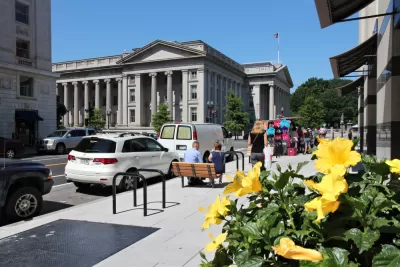The humble curb is getting crowded: not only with new modes of transportation, but also with a slew of new data tools aiming to keep track of it all.

Andrew Small and Laura Bliss report on an increasingly active space: data platforms providing real-time information on how curbs are being used. They include Open Curbs, a tool from Sidewalk Labs spinoff Coord, "which pins the locations of wheelchair cuts, fire hydrants, bus stops, and other physical assets that define the curb to digital maps, available to anyone who's interested in using them."
The idea is to give public officials, mobility companies, and researchers a better picture of what's going on in a space that, according to Coord CEO Stephen Smyth, remains "relatively un-digitized." Many of these startups focus on the often-fraught nexus between new mobility companies and the public sector. For instance, a tool from data company Populus "gives cities access to parking data from e-scooters and e-bikes operated by private companies." Another, from transit data startup Remix, provides data visualization and analysis options.
On the public end, the Los Angeles Department of Transportation is experimenting with its own API that obtains real-time trip data from private scooter companies. This lets the city "understand where vehicles are distributed across the city, and to adjust and enforce regulations for private mobility companies directly through their apps."
While many see potential in smarter systems for curb management, Small and Bliss write that "the new, data-oriented products that aim to pave over conflicts at the curb are also raising new conflicts about privacy and governance of public space."
FULL STORY: The Race to Code the Curb

Alabama: Trump Terminates Settlements for Black Communities Harmed By Raw Sewage
Trump deemed the landmark civil rights agreement “illegal DEI and environmental justice policy.”

Study: Maui’s Plan to Convert Vacation Rentals to Long-Term Housing Could Cause Nearly $1 Billion Economic Loss
The plan would reduce visitor accommodation by 25% resulting in 1,900 jobs lost.

Why Should We Subsidize Public Transportation?
Many public transit agencies face financial stress due to rising costs, declining fare revenue, and declining subsidies. Transit advocates must provide a strong business case for increasing public transit funding.

Paris Bike Boom Leads to Steep Drop in Air Pollution
The French city’s air quality has improved dramatically in the past 20 years, coinciding with a growth in cycling.

Why Housing Costs More to Build in California Than in Texas
Hard costs like labor and materials combined with ‘soft’ costs such as permitting make building in the San Francisco Bay Area almost three times as costly as in Texas cities.

San Diego County Sees a Rise in Urban Coyotes
San Diego County experiences a rise in urban coyotes, as sightings become prevalent throughout its urban neighbourhoods and surrounding areas.
Urban Design for Planners 1: Software Tools
This six-course series explores essential urban design concepts using open source software and equips planners with the tools they need to participate fully in the urban design process.
Planning for Universal Design
Learn the tools for implementing Universal Design in planning regulations.
Smith Gee Studio
Alamo Area Metropolitan Planning Organization
City of Santa Clarita
Institute for Housing and Urban Development Studies (IHS)
City of Grandview
Harvard GSD Executive Education
Toledo-Lucas County Plan Commissions
Salt Lake City
NYU Wagner Graduate School of Public Service





























